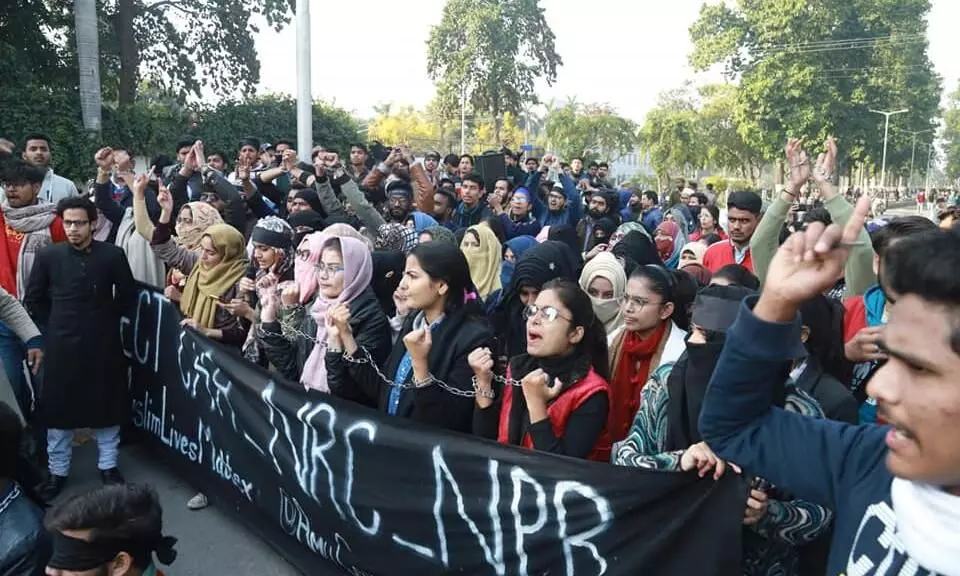
Citizens' Movement and Sharjeel's Arrest: News from Aligarh
text_fieldsState hunting and arrests of anti-CAA protesters have generally continued unabated during the epidemic. In the face of social isolation, the struggles have eased and the state's crackdown on protesters has gained momentum. Uttar Pradesh police have arrested and jailed Sharjeel Usmani, a student of Aligarh Muslim University and a prominent figure in the citizenship movement across India. The arrest was made in connection with the police action in the riots in Aligarh.
The anti-NRC movement was gaining strength mainly in Bengal, even as Assam's lists of forty-one lakh and nineteen lakh citizens werre released. The agitation also heated up in December 2019 when the Citizenship Amendment Bill reached the Lok Sabha. With the participation of Rajiv Yadav, Abdullah Assam, Kafeel Khan, Afrin Fatima and Yogendra Yadav, and a hunger strike attended by about 5,000 campus students, Aligarh was at the forefront of the struggle across India on the same day. As Sharjeel, who was at the helm of the Aligarh agitation at the time, later made it clear in an interview with a Dalit camera, the fact that the agitation in Aligarh had solidified the Muslim genocidal agenda of the CAA and NRC laws politically had a profound effect on the agitation that later emerged across India. Sharjeel has been able to determine within the struggle ideas that would ensure Muslim politics, leadership and the participation of the Muslim masses.
The Aligarh campus was active for the first two weeks of December with a variety of protests. The situation in Aligarh was normal on the day of the police violence in Jamia Millia, the main cause of the largest protests in the country. By then, the students had completed the semester exams and started returning home for the winter holidays. And other students were preparing for the rest of the exams. But the campus was in turmoil as news of Jamia's brutal police brutality began to surface. The emotional connection shared by Jamia and Aligarh has also played a role in shaping the strong agitation in it.
As the fact-finding team led by Harsh Mander pointed out, the university later became a battleground. That night was a testament to how saffron a police system is and how irresponsible an administration can be to its students and to the authorities. Police in riot gear stormed a rally on Friday, removing hundreds of protesters by truck. Abdul Hamid, university registrar and IPS officer, was allowed to enter the campus, a fact later released by a leading channel with his own footage. After the Jinnah controversy two years ago and the shooting of former Vice President Hamid Ansari at the university by Sanghi assailants, the UP Police Rapid Action Force (RAF) was ready to enter the campus as soon as permission was granted. For the past two years, students have been flocking to campus to see police armed with deafening noises and high-powered sound grenades and AK-47 rifles used only on the battlefield.
Police in riot gear stormed a rally on Friday, removing hundreds of protesters by truck. One student lost his hand and another had his fingers cut off in a sound grenade attack by police. Hundreds of students were seriously injured. Police even beat the ambulance driver who took the injured students to the University Medical College (JNMC, Aligarh). Ambulances from outside were not allowed inside by police. They stormed into the college hostel and set the hostel room on fire, arresting several students who were unconscious due to shortness of breath and beating them to death in a jeep and at the police station. Students' vehicles were smashed.
The fact-finding team appointed by the Allahabad High Court on the students' complaint had convinced the court that it was the police, not the students, who were to blame for the incident. The court also ordered action against the culprits. This was the first part of how the university authorities and the police dealt with the anti CAA protests.
Despite the complete evacuation of students from hostels, protests continued in Aligarh as in other parts of the country. The second part of the brutal rule of the police starts at this point. Police later confronted the students with fake cases and huge FIRs, including carnage. The content of many was fictitious and false. In addition, there are arrests. Police raided not only the students who took part in the anti-CAA protests but also many who visited Aligarh and expressed solidarity with the agitation. Former IAS officer Kannan Gopinath, who was scheduled to visit the campus on January 4, was denied a travel permit on his way back. He visited the campus on Thursday, December 12 and addressed the student protest. Kafeel Khan was arrested on January 29 in Mumbai by a special task force of UP police. He was earlier arrested on a charge of treason for lecturing at a university. Kafeel Khan was later acquitted by the Allahabad High Court but re-incarcerated by the UP government under the Public Security Act (PSA).
At the time of writing, there are reports that his health is deteriorating. IFurther, he next day his bail application was rejected by the court and the case was adjourned. The same week, JNU student Sharjeel Imam was arrested for allegedly lecturing in Aligarh. Like Sharjeel Usmani, Imam was an intellectual who put forward clear views on the politics of the citizenship movement and was an early organizer of the Shaheen Bagh movement. He is currently lodged in Assam Jail without bail pending trial in several states.
In addition to all this, the student hunt reached Sharjeel Usmani at the end of the epidemic. Several people, including student leaders of Jamia Millia and JNU, were arrested in Delhi during this period. Prominent activists and Muslim student/political leaders have been arrested on ridiculous charges from conspiracy to riot in north-east Delhi. In Aligarh, student leaders, including Farhan Suberi, are still in jail, with the exception of Aamir Minto, who was recently released on bail. The constant arrests and state hunt of students are a testament to the machinations of the police on behalf of the state.
Shjarjeel's family had responded that he was taken away by five plainclothes policemen from his home in Azamgarh. Sharjeel was taken into custody without an arrest warrant or specific information. Sharjeel, who was earlier at the forefront of leading the civil strife in Aligarh, has been charged with aggravated burglary with the permission of the university, police said. In addition to attempted murder, riot, provocation with intent to incite riot, and destruction of public property, the Goonda Act has also been invoked against him. Sharjeel Usmani is one of the most notable leaders in Aligarh politics. He transcends the boundaries of traditional Muslim politics and shares a keen insight into the state and mainstream politics. He and Afrin Fatima can be seen as the representatives of the new political consciousness emerging in North India. Sharjeel has visited several states to organize the citizenship movement and has worked hard to maintain the politics put forward by the citizenship movement. As the National Secretary of the Fraternity Movement, he was also active in student-political mobilisation. His ideologically well-defined writings have also made him a familiar face to the new generation of Muslim leaders. The ongoing police crackdown should be seen as aimed at the political self-sufficiency that the Muslim community achieves through the citizenship movement.
(The authors are students of Aligarh Muslim University)
























